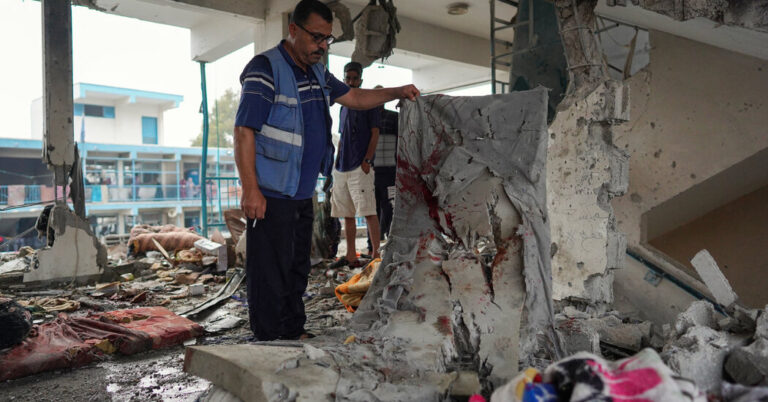Israeli Prime Minister Benjamin Netanyahu on Wednesday threatened further military action against Hezbollah in Lebanon amid growing talk of another full-scale war even as Israel battles Hamas in the Gaza Strip. Gaza.
Two days after Hezbollah militants launched a barrage of explosive rockets and drones from Lebanon into northern Israel, sparking several forest fires, Mr. Netanyahu visited soldiers and firefighters in the region and declared that the Israeli army was ready to strike.
“Anyone who thinks they can harm us and that we will respond by doing nothing is making a grave mistake,” he said, according to the Israeli government. “We are prepared for very intense action in the North. One way or another we will restore security to the north.
Other Israeli officials have threatened war in Lebanon against Hezbollah, which has intensified its attacks in northern Israel since the start of the war between Israel and Hamas in October. But the bellicose remarks carry more weight coming from the highest levels – not only from the prime minister, but also from the military chief of staff and a minister.
Israeli forces and Hezbollah, an Iranian-backed militia and political faction that exercises de facto control over southern Lebanon, have been trading strikes for months, forcing more than 150,000 people on both sides of the border must flee.
On Monday, the Lebanese television channel Al Manar, controlled by Hezbollah, said the group fired on Israeli soldiers in several places near the border, starting fires and claiming to have caused casualties.
One of the most intense fires threatened homes in the Israeli town of Kiryat Shmona, near the Lebanese border, according to Israeli media. This town, like much of the Israeli border area, has been largely evacuated for monthsand no casualties were reported.
On Wednesday, Hezbollah claimed responsibility for a new drone attack in the region. The Israeli military said two drones landed in the area of Hurfeish, a Druze village whose citizens are primarily part of an Arab-Israeli minority in Israel. At least 11 people were injured, one seriously. No sirens sounded to warn of the attack, according to the Israeli military, which said it was investigating the incident.
Such strikes – and threats of more direct military action – have raised concerns about the prospect of Israel waging a two-front war.
On Wednesday, State Department spokesperson Matthew Miller said the Biden administration remained “incredibly concerned” about the risk of escalation between Israel and Hezbollah.
“That said, the Israeli government has long maintained – privately and it has said publicly as well – that its preferred solution to this conflict is a diplomatic solution, and we continue to seek a diplomatic solution,” Mr. » Miller said.
The Biden administration held talks with Israel and Lebanon, exchanging messages with Hezbollah through intermediaries. The talks are aimed at keeping Hezbollah forces away from the border, according to Lebanese and Israeli officials, as well as other participants.
But Hezbollah has repeatedly said it will not negotiate until the end of the war in Gaza, and Israeli military officials said this week that they were increasingly frustrated by Hezbollah’s attacks.
“We are approaching the point where a decision must be made, and the IDF is ready and prepared for that decision,” Lt. Gen. Herzi Halevi, chief of staff of the Israeli army, said Tuesday.
Far-right leaders in Israel are calling for war against Hezbollah in Lebanon. “The time has come,” Bezalel Smotrich, Israel’s Finance Minister, said on social media on Wednesday. “There is total support from the entire Israeli people. »
Israel invaded Lebanon in 1978, 1982 and 2006 in an attempt to eliminate armed militants who had launched attacks against Israel.
Adam Rasgon And Ephrat Livni reports contributed.


